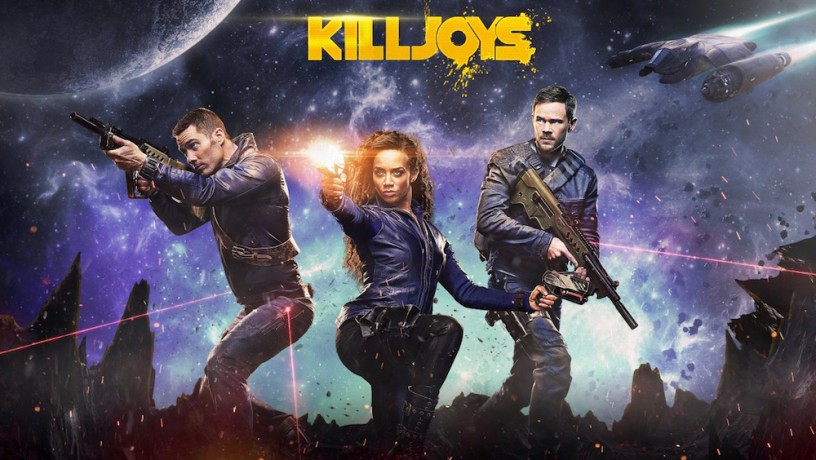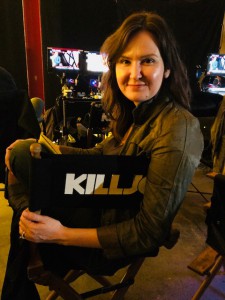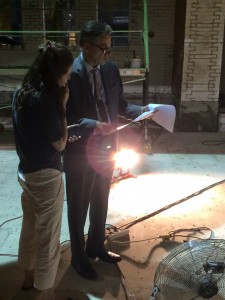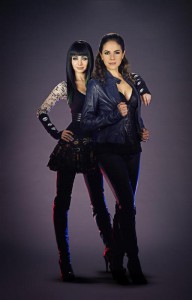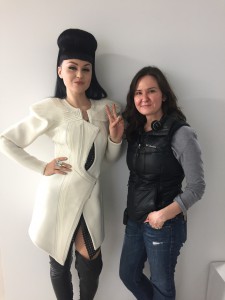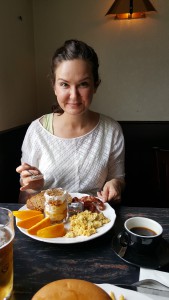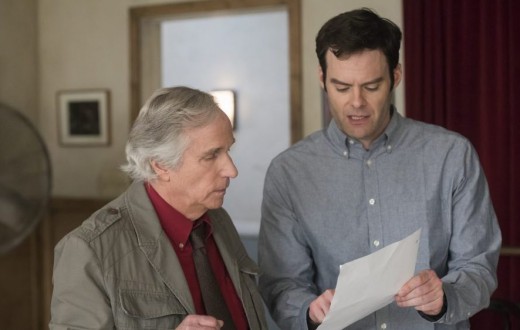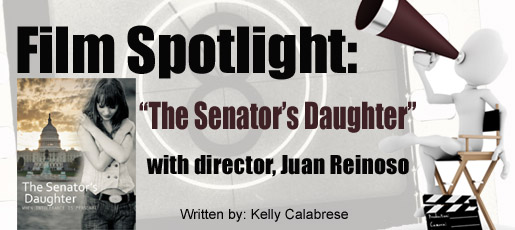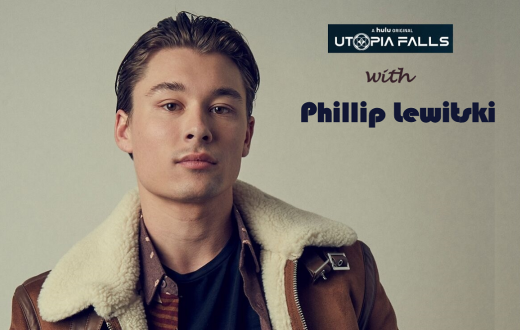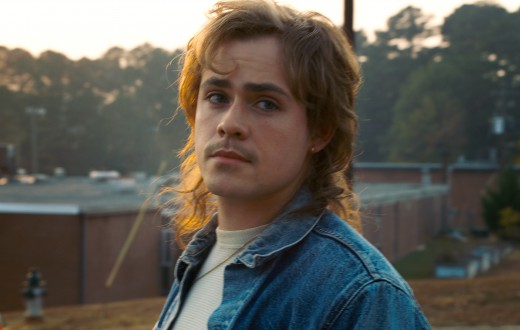Television is a great beast that we’d all love to conquer. As actors, we want to be able to develop a character, and having a series that runs multiple seasons is the way to do just that. It’s all about keeping the story alive!
The several tiers the production goes through to finally get to series is a long process. The actor waits…and waits. Once the series is green lit, there’s more waiting, but now it’s waiting to see if the series gets picked up for another season, and then another… it can drive you bonkers!
NYCastings, your all-point access for everything related to show business from the actors’ point of view, had the pleasure of speaking with MICHELLE LOVRETTA, the creator of such shows as KILLJOYS (on SyFy) and LOST GIRL.
Michelle gives insight on how the actors help a show mature, what happens when an actor needs to leave for personal reasons and how the news is broken when a show is canceled. That being said, Michelle also delves into what it takes to keep a series going — something all actors wish for!
Your shows Lost Girl and Killjoys both passed the scary two season mark, with Lost Girl having five seasons and Killjoys currently on its fourth season. What magic is performed to make your series last such a great length?
Killjoys will air our fifth and final season sometime next year, too, so maybe five is my lucky number? No complaints! Obviously, there are no real “tricks” for longevity, but I think I can look at my shows and see a few things that helped: concept, characters and casting.
Michelle Lovretta in the Killjoys video village, the place producers & directors sit to watch the monitors during shooting.
You need a concept strong enough to attract an initial audience the crucial first year, that is producible within a reasonable budget, and that has a built in story engine ensuring that you can tell this story for years to come. Lots of TV ideas make for great pilots but unsuccessful series, simply because they run out of story.
Even if people come for the concept, they usually stay for the characters. Movies are a one night stand, but television is a longterm relationship, so the audience needs to love your leads. They don’t need to LIKE them, necessarily (it definitely helps), but they do need to be drawn to them, find them believable, and care about what they do next. Creating fresh-feeling characters and casting them extremely well is key to renewal. Actors are a huge part of every multi-season success story.
One dream actors have is to be on a long-running series. When you create a series, do you have in mind how many seasons you want it to run, so it can have a proper ending? Who is ultimately in charge of renewing or cancelling a show? How much heads up do you receive?
I usually create a five year template as a sort of litmus test to myself in the development phase, but that template often shifts radically once production begins. Television is an organic group effort, so you have to stay nimble and keep your storytelling flexible as circumstances around you change. Romances you love on the page may not work as well on screen, or an actor may leave for a different show, or the writing team may pitch you a new story arc so compelling you decide to cut something else to make room.
My job is to make the most entertaining show that I can that is also on time, on budget, and has the “story legs” for many seasons to come… but beyond that, a renewal is out of my hands. The audience decides if they want to keep watching, networks decide if they want to reorder, and studios decide if they want to shop you around. Me? I just wait, and hope, every damn time. We don’t usually get a lot of heads up notice — when you see frantic showrunners on social media saying they “still don’t know” if they’ve been picked up yet, that’s usually legit. Be gentle. They’re probably about to pass out.
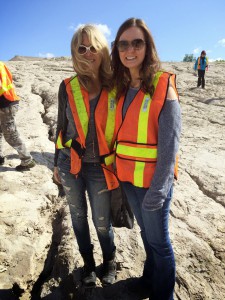 Killjoys Executive Producer Karen Troubetzkoy and Michelle Lovretta scouting a quarry on what’s called a Tech Survey – when crew and director go visit a location before shooting there, to see what equipment will be needed.
Killjoys Executive Producer Karen Troubetzkoy and Michelle Lovretta scouting a quarry on what’s called a Tech Survey – when crew and director go visit a location before shooting there, to see what equipment will be needed.
When you receive word the show will end, how do you break this to the cast and crew?
Every series is different. How you handle the news depends on when you find out, how sure you are, whether cast options are about to expire, stuff like that. The final decision can take a lot of time, and change day to day until set in stone — especially now, when so many “canceled” shows are saved by other streamers or nets.
The day our Killjoys season 3 finale aired — just hours before the public announcement was made that we were ordered for two final seasons — I still didn’t know for sure if we were renewed or canceled. Signs were good, but rule of thumb in this industry is never believe it until it’s official. So I wrote our three leads a group email the night before and asked how they wanted to find out if we were canceled – through me, through their reps, by phone or carrier pigeon. Good news they can hear from anyone – bad news is my job. But I’m extremely fortunate, so far I’ve never had to give the “we’re abruptly canceled” speech. I assume it would involve tears and alcohol. There will be a lot of both for me when our final season airs next year.
Being the Creator, writer and showrunner, how do you prepare if an actor wants to leave the show? Example: The show gets picked up for another season so the actor wants to re-negotiate his/her contract. During this time, are you still writing scripts? Do you write two versions, one with and one without the character? How long can YOU wait before you have to decide what to do with that character?
Hmm. Well, first, I’d want to know why they want to leave. Are they unhappy for legit reasons, and if so, can I help? Did they get an amazing opportunity elsewhere, and I want to advocate for them if I can? Are they a toxic jerk, and I can’t wait to write that death scene? (Okay, I’ve never encountered that last scenario, but I think we’ve all read about them.)
Television contracts are usually multi-year for lead cast, so they tend to be locked in. Leaving the show under those circumstances is a big deal, though not unheard of. I’ve certainly been in writing situations where we weren’t sure if a cast member was available, usually in cases where you don’t have a secondary cast member under a first position option and they could book something else at any time; or where an actor’s reps have prenegotiated an exit for a personal commitment, movie reshoot, etc. You just hope for the best, prep the strongest story you can, and have a backup plan if you ultimately can’t book them. And, yes, sometimes — if you have enough advance warning and the character or storyline is crucial enough — you may write two or three versions of an episode so that you’re prepared with options. I’ve done that. I don’t ever want to do it again.
As far as “how long can you wait”, well, actors are human – sometimes they get ill or have an accident or can’t travel, and in those cases you get NO warning. So you deal with it. You pull all nighters, maybe rebreak an emergency draft with the team on Friday for something that shoots Monday, and then work with your director (and AD …and line producer …and locations supervisor …and heartburn meds) to move scenes around and buy time. Hopefully, you have the budget to reshoot or the story flexibility to compensate – but often, you’ll have neither. That’s just TV. Shit happens – be decent about it.
Michelle Lovretta and Andrew Stearn, the Production Designer on Killjoys Season One. They are looking at drawings for the Royale bar while they stood in that set as it was built.
How do you have time to read if you’re so busy writing? What are some of your CHILDHOOD favorite books and authors? Now?
As a kid my favorite books all involved swords or spaceships; not much has changed.
One of the petty things I dislike about my job is that I spend so much of my day reading and writing for work that I have no energy left to read for pleasure. Now that Killjoys is ending, I’m finally going to be able to make a dent in the huge pile of books I’ve been saving up. I’ve been lucky enough to “meet” some great writers and publishers online who have sent me their latest and those books are now on the top of my pile: I just started Charlie Jane Anders’ “The City In The Middle of the Night” and it’s blowing my damn mind, and then I have a ton of comics from Boom to eat up, starting with their Sparrowhawk series.
You’ve had LGBT representation in Lost Girl and Killjoys. Do you find the fanbase changes when LGBT characters are brought into the series?
You know, I’ve never really tracked audience numbers as relates to those relationships, or the straight ones, so I’m not sure? Shippers are definitely a big, fun, loud fanbase, whatever couples they support. But in the end, that’s not really why I’m writing these love stories. I’m writing them for me. Lost Girl was developed well over a decade ago and it was the second series I built around a gay character (the first was a legal series starring a lesbian that I may develop again soon) and trust me, back then you didn’t pitch “my show is super inclusive, y’all” expecting it to be an easy sell. I write and fight for these characters because I love them and their crazypants, fictional worlds.
Ksenia Solo & Anna Silk aka Kenzi & Bo, Lost Girl.
Most of my writing features a variety of sexual identities for three simple reasons – because that’s the real world; because that’s how those characters were born in my head; and because I value all orientations and don’t self-edit. Main characters pop into my noggin pretty fully formed: I know if they like pudding or pie, I know if they prefer their mom or their dad, and I usually know who they’re attracted to. Then I just let them be who they are and follow their story wherever it takes us.
Are there any differences in the way you write a storyline if the couples are male / male, female / female, male / female? Do you have more of a passion for same sex or different sex couples when it comes to the story?
None that come to mind, other than trying to be mindful of toxic tropes so that I can avoid casually hurting people.
Ironically, I’m not a very sentimental or romantic person in real life, yet I love exploring relationships through my writing — parental, platonic, romantic. Maybe that’s just a safe way for me to socialize and bond with a ton of different people, while staying a happy hermit? Writing: it’s like relationship cosplay!
Honestly, though, as much as I love worldbuilding as a genre writer, it’s really FAMILY building that thrills me, especially the found families we choose on our own. And if some evil wizard told me I had to pick only one type of relationship to write over and over for the rest of my life, it would definitely be platonic soulmates, like Bo & Kenzi in Lost Girl, and Johnny & Dutch in Killjoys. That’s my true oxygen.
When you started out in show business, did you ever think you’d end up doing conventions such as Fan Expo Canada, where you could actually meet and talk to the fans? Did hearing the fans’ voices ever cause you to change a storyline?
Ha! Well I’m a big nerd but an even bigger hater of crowds and lines, so I’m really lucky — the first con I ever attended was as a guest on a panel for my own show. They zip you right in. That’s still the only way I’ve ever experienced SanDiego Comic Con, with Lost Girl. Shit is it ever fun. Meeting our fans has been a thrill, they’re so passionate and kind and smart. And many have taken the time to tell me that the types of stories and characters I’m writing made them feel seen and respected. That matters to me.
I can’t think of anything fans have said about any characters or storylines that have made me change anything, though? I’ve been doing this a long time, and I’ve learned three things about fan feedback: someone will always hate what you do, someone will always love what you do, and the loudest voice isn’t necessarily speaking for the largest fanbase. So it kind of becomes a wash and cancels itself out.
Viktoria Modesta, a very very cool “Bionic Pop Star” from the UK, who guest starred in Killjoys Season Three, with Michelle Lovretta.
In real life, what makes you laugh? What makes you cry? What makes you angry? Do you use your real emotions to write scripts?
Oh, I’m pretty simple. I care a lot about my sense of what’s right versus what’s unfair, and that’s the type of shit that sets me off. I despise cruelty, bullies, thieves, cowards, entitlement, all the “isms” – the usual shit. I’m not an easy crier, but goodbyes, and acts of true selflessness, make me bawl. I cry for things that are too beautiful and pure and good. Humanity at its best, when conditions are at their worst.
I’m sure all of this, as well as my specific sense of humor, shows up all over my work. Whether I want it to, or not.
Anything else you’d like to add to help actors understand the process of a series being extended season after season?
These days there are a million different intangibles that exist on the business end of the renewal equation — is it selling well internationally, does it draw good enough numbers or critical praise at home, is it “noisy or buzzy” on social media, does someone high up at the network love it enough to champion it. All of those things are out of your hands, though, so I usually try to make my peace with the fact that every last episode of a season that I write may also be the last episode of the series, ever — because, you just never know. Most actors understand that, and do the same.
But, as far as your ROLE being extended season after season, remember: all small roles are an audition for a bigger one on that same show.
Many of our longest running, most beloved characters on both Lost Girl and Killjoys started out as day players we hadn’t intended to see again, but the actors so elevated their small parts that I instantly wanted to keep writing them. It’s…alchemy. Turin (Patrick Garrow) started with just one single scene in the Killjoys pilot, but became a regular for five seasons. Gared (Gavin Fox) started as a one-off villain, but had such great chemistry with Pree (Thom Allison) that they became one of the show’s main romances. Many secondary characters survive for multiple seasons not because the story dictates it, but because the writers are excited to write bigger and better arcs for that actor/character combo. That “surprise factor” is one of my favorite parts of writing for television, and unique to the medium – in a novel, there’s no actor there to add a new spin for you; in film, you very rarely have a sequel with which to expand a character’s role. TV is organic, growing, flexible. Actors can really have a helping hand in shaping it.
Every job is an audition for another one. Be kind, be professional, commit to the part. You never know what might happen next…
Michelle Lovretta having breakfast in Iceland at a restaurant in Reykjavik.

